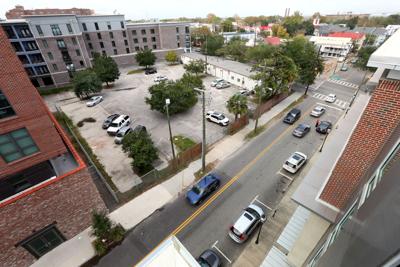A Charleston zoning board says it didn't make an error in approving a large hotel on the peninsula.
The Historic Charleston Foundation challenged the approval in February, saying a new ordinance brought before City Council last year could have allowed the board to reject the 252-room lodging proposed at 431 Meeting St.
That ordinance, if passed, would bar large hotel developments with more than 50 guest rooms in that area of the peninsula.
Historic Charleston said on its website last month that it "strongly believes that the overwhelming presence of multiple large hotels in the immediate vicinity ... creates the developing threat of a monoculture of use in this important part of our city."
As the rules stand now, if a hotel in that area of the peninsula meets certain requirements — such as having meeting space and a full-service restaurant — it can qualify for a special exception from the 50-room limit.
At its Feb. 19 meeting, the Zoning Appeals Board found that the proposed project for 431 Meeting met all of the legal criteria and approved it.
The vote prompted hesitation from some board members, including the chairman, Leonard Krawcheck, who said he was "looking for a way to turn it down" but couldn't find one.
Krawcheck did not participate in Tuesday's appeal hearing. Instead, board member Ross Appel led the discussion.
Historic Charleston's challenge focused largely on what's called the "pending ordinance doctrine." That allows a voting body to deny an application if it violates a new rule that's in the process of being adopted.
Asked whether that applied in this case, city planning director Jacob Lindsey said last month that he didn't think so. The reason was that City Council hadn't given the proposed zoning change a first reading.
Rutledge Young, an attorney for Historic Charleston, said a first reading is not necessary for the doctrine to kick in. The ordinance in question was deferred in August and could still be adopted, the group has argued.
Charleston attorney Capers Barr, who represents the developer, said the city could not justify overriding its existing zoning rules in this instance.
After a brief discussion, the board voted down the appeal, 4-to-1. Allison Grass, who did not attend the Feb. 19 meeting, abstained. Appel cast the dissenting vote.
Had Historic Charleston prevailed, the developer's request wouldn't have been denied, but it would have resulted in another hearing and, potentially, a different outcome.
Several zoning board members, after seeing residents and at least one neighborhood association member at this week's meeting, expressed frustration that they didn't attend the February hearing to air their concerns.
The site of the proposed hotel is still owned by the Charleston School of Law, which bought the corner property from the city in 2005 for an expansion of its campus. A developer from Charlotte has a contract to buy it.
The for-profit school stands to net millions from the sale. It has said it plans to use the proceeds to build elsewhere on the peninsula.








